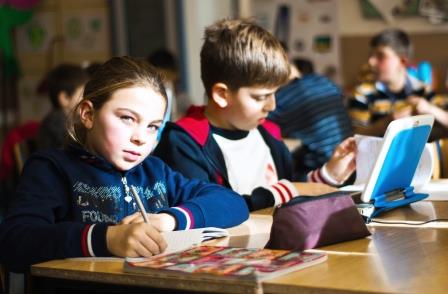Start date: December 2011
End date: March 31, 2017
Implementer: Macedonian Civic Education Center in partnership with other local NGOs
Objectives
- Build the awareness and capacity of education institutions, school management, teachers, parents, municipal officials and journalists to deal with diversity and multi-ethnic issues.
- Increase opportunities for positive interaction among students of different ethnic origin.
- Provide diversity training and incentives to communities in support of the central and local government efforts for ethnic integration.
Components
Community Outreach – Raise local community awareness of the importance of inter-ethnic integration and why it is vital for the future stability of Macedonia and its accession into the European Union. Work with journalists and media to report positive ethnic integration stories.
Capacity Building of institutions, school management, and teachers – Provide Ministry of Education, Bureau for Development of Education, State Education Inspectorate, Vocational Education Training Center staff, as well as teachers, school managers, and school boards with the skills they need to work in a multi-ethnic environment, to help prevent divisions along ethnic lines in their schools and communities, and to create conditions that promote ethnic integration.
Demonstration Schools - Provide more holistic and intensive interventions in six selected schools. These model schools provide examples of best practices and lessons learned and will contribute to a deeper understanding on various approaches to ethnic integration.
Provision of Incentives to Schools and Communities - Provide school refurbishments as an incentive for schools to participate in ethnic integration activities. Encourage these communities to work together to improve the infrastructure and learning environments of their schools, including ensuring that these schools are accessible. This component is financed by the U.S. Department of Defense/EUCOM ($1.5 million of the total Project budget).
Results/Impact
The project has increased awareness of the importance of good ethnic relations and has built a solid foundation for positive interactions among students of different ethnic origin. IIEP reached out to all primary and secondary school communities country-wide and established a solid relationship with the central and local governments and local leaders; helped develop a foundation for systemic changes in the education system that promote ethnic interaction in ethnically homogenous and heterogeneous schools; helped create a functional nation-wide Performance Management Plan on Ethnic Integration; strengthened capacities of the national-level Working Group on Integrated Education; and contributed to the sustainability of EI.
Selected high-level results contributing to sustainability:
- Most of the primary and secondary schools country-wide have well trained, functional School Integration Teams with over 2,800 members, which have been recognized as initiators and resource bodies for all ethnic integration activities in schools;
- Majority of schools have either established school partnerships with school/s of different ethnic language or have internally organized joint student activities;
- Ethnic integration activities have become integral part of the Annual Work Plans of 76% schools;
- Majority of multilingual schools enriched the school hallways iconography to reflect the diverse student ethnic composition;
- The Ministry of Education and Science mandated the use of School Maintenance Protocol in all schools and dorms;
- The State Education Inspectorate adopted Indicators for Ethnic Integration, evaluated as part of the mandatory School Integral Evaluation;
- The Bureau for Development of Education fully adopted the procedure for teachers’ certification in the area of ethnic integration;
- Most of the pre-service teacher training institutions included the concept of ethnic integration in their curricula and syllabi.
- The Parliament of Macedonia passed new articles in the Laws on Primary and Secondary Education that enable schools to compete for funding to “…plan and organize joint student activities that contribute to multiculturalism, integrated education and mutual acceptance” (July 2016).
- Sixty-three schools have been renovated with the U.S. EUCOM funding; schools and municipalities cost-shared with over 33 percent of the total renovation funding.
Contact Information
Contact at USAID: Lela Jakovlevska, AOR ljakovlevska@usaid.gov
Chief of Party: Nebojsa Mojsoski nmojsoski@mcgo.org.mk
Information Officer: Xhevahire Pruthi Zajazi xhpruthizajazi@mcgo.org.mk
Website: www.pmio.mk








Comment
Make a general inquiry or suggest an improvement.